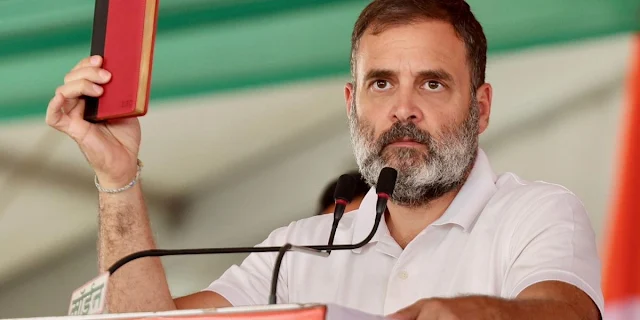 |
| Rahul Gandhi. Photo: X/@RahulGandhi |
Rahul Gandhi, a prominent leader of the Indian National Congress, made noteworthy promises and accusations during a rally in Khargaon, Madhya Pradesh. He declared that if the Congress party is elected to power in the ongoing Lok Sabha elections, they will promptly waive off loans for farmers. Furthermore, Gandhi asserted that his party would eliminate the 50% cap on reservations, which are affirmative action measures aimed at providing opportunities to historically marginalized communities.
Watch the rally where Rahul Gandhi made key promises for farmers and reservations. https://x.com/INCIndia/status/1787421876056191223
During his address, Rahul Gandhi accused the Bharatiya Janata Party (BJP) of intending to abolish reservations if they come to power. He claimed that BJP leaders have expressed their desire to dismantle the current reservation system, which benefits Scheduled Castes, Scheduled Tribes, and Other Backward Classes. In contrast, Gandhi promised that a Congress-led government would not only maintain existing reservations but also expand them beyond the current limit of 50%. He emphasized the importance of reservations in ensuring social justice and empowering disadvantaged sections of society.
Rahul Gandhi challenged Prime Minister Narendra Modi on key issues such as reservations, the Constitution, and welfare policies. He questioned Modi's stance on reservations for Adivasis (indigenous communities) and whether his government would increase the 50% cap on reservations. Gandhi framed these issues as central to the ongoing election, highlighting the Congress party's commitment to protecting the rights of the poor and marginalized.
In addition to addressing reservation policies, Gandhi outlined a series of welfare measures proposed by the Congress party. These include providing financial assistance of Rs 1 lakh to each family, offering Rs 1 lakh to youth for employment opportunities, waiving farmers' loans to alleviate agricultural distress, doubling the wages of ASHA and anganwadi workers, and increasing the minimum wage under the Mahatma Gandhi National Rural Employment Guarantee Act (MGNREGA) to Rs 400.
Meanwhile, Prime Minister Modi, campaigning in Nabarangpur, Odisha, sought to deflect attention from allegations of corruption surrounding his government. Modi claimed that the people of Odisha had rejected both the Congress and the ruling Biju Janata Dal (BJD) in favor of his Bharatiya Janata Party (BJP). He touted his government's efforts to combat corruption, citing the implementation of initiatives like the Jan Dhan Yojana, Aadhaar, and mobile connectivity to prevent the misappropriation of funds meant for the poor.
Modi's remarks come amidst scrutiny over the BJP's handling of electoral bonds, which have raised concerns about potential corruption within the party. Despite ongoing controversies, Modi reiterated his commitment to rooting out corruption and ensuring accountability within his administration.
In summary, Rahul Gandhi's speech in Khargaon underscored the Congress party's promises of economic relief for farmers, expansion of reservation policies, and overall welfare initiatives aimed at addressing social inequalities. In contrast, Narendra Modi sought to deflect criticism and emphasize his government's purported efforts to combat corruption and promote transparency. These contrasting narratives highlight the key themes and stakes involved in the ongoing electoral contest in India.


0 Post a Comment:
If you have any doubt, Please let me know